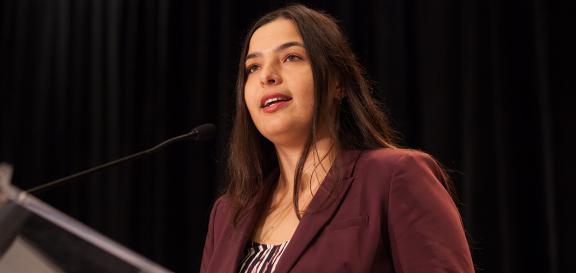Delegates began the last day of convention by passing a resolution to “repower” our Crown utility, BC Hydro. The resolution stated that the union will review the current policy direction of the utility and set out a new clean energy mandate for BC Hydro that supports our economy, is respectful of First Nations, sustains our environment and mitigates impacts to low-income ratepayers.
While the union had already been doing some of this work, this resolution codifies this direction. The resolution was carried unanimously.
Creation of the Opal Skilling Award
Opal was a long time officer in local 15, which merged with MoveUP in 2010. Local 15 was created in 1962 by fifteen brave women who worked for trade unions. These women took on the labour movement to gain rights and fair wages. Local 15 acted as a conscience of the workplace and their influence is still felt today. Opal Skilling also spearheaded our dispatch system. To honour her, MoveUP is planning to have an annual scholarship in Opal’s name in early 2016.
National Report – Gwenne Farrell
The National COPE SEPB report was delivered by Gwenne Farrell. She reminded delegates the National union’s convention would be coming up in June 2016 in Toronto. She applauded the efforts of the new National president Simon Berlin in growing the union’s capacity and activism in global issues, as well as caretaking our defence fund, which has increased significantly since it’s start only 11 years ago.
Vice-President Elections
The balloting committee announced the results of the Vice-President elections. Annette Toth was the successful candidate for the Vice-President for ICBC and Alicia Gallo was the successful candidate for Vice-President for Combined Units. President David Black congratulated the successful candidates and thanked candidates Joyce Galuska and Tim Weigelt for their work enriching the debate and democracy of the union.
Multicultural Committee Report
New board member Inner Johal delivered the report for the Multicultural Committee. The committee’s goals are to promote our union in diverse communities and to get involved in activities that honour our diversity and that build trust. He told delegates how the committee has been involved in Lunar New Year, Vaisakhi, the Dragon Boat Festival, the delivery of moon cakes for mid-autumn festival, the reconciliation bus tour of First Nations sites in the Fraser Canyon, the Surrey Fusion Festival and PeerNet BC.
The multicultural committee wants to reach as much of our diverse community as possible and welcome’s to members’ suggestions for events and activities over the next year.
Organizing Report
The organizing report laid out how the past term has been one of change in our union. We engaged in focus groups of our members to test our organizing tools and our brand. We are excited to move forward as MoveUP.
We had a number of workshops and will have more opportunities in the coming year.
Some of the organizing successes we had this year included certifications at: Burnaby English Language Centre, the Vancouver Police Credit Union, new members at Avis and Hertz, the Vancouver Musician’s Association and the Musician’s Association of Vancouver Island and the Gulf Islands. We also have several ongoing campaigns and are always looking at new opportunities to bring people in and grow.
Constitutional Amendments and Bylaws
All of the remaining amendments were housekeeping items and they all carried.
Environment Committee Report
Calvin Jonas presented the report. He talked about Climate Smart formulas and how we can implement them at work. In 2009 we became the first union in BC to become carbon neutral. To do so, we made efforts to move to an electronic filing system and expanded the use of email. We reviewed our purchasing policies and looked at the way we’re handling meetings – specifically, scheduling them together to cut down on travel. But there is still work to be done.
Guest Speaker: Iglika Ivanova – Senior Economist and Public Interest Researcher at the Canadian Centre for Policy Alternatives
We were pleased to have Iglika Ivanova address delegates on the potential of public policy in shaping a more just society.
Ivanova explained that inequality is a pressing issue for us all. “It is one of the key issues of our time that we need to address,” she said. “We often wonder why we have poverty in such a wealthy society.” She continued to say that ending poverty is crucial, but poverty is not the end of the story we’re talking about income inequality.
Ivanova had us look at what’s happening at the top of the wealth spectrum.
She quoted Secretary-General of the OECD Angel Gurria who said, “We have reached a tipping point. Inequality can no longer be treated as an afterthought.”
We are starting to realize that “growing the economy” will not fix inequality, Ivanova explained. Inequality is deeply supported by systemic strucutres. She went on to give the example that every year, by January 2, on the first working day of the year, at 11:42am, Canada’s top 100 CEOs will have already earned as much as the average worker will earn in the entire year.
Ivanova asked us to question who benefits from economic growth and the way growth is shared is different in different countries. For example, in Denmark it is quite equally distributed. In Canada, only 37 per cent of economic growth goes to the bottom 90 per cent of the population.
It hasn’t always been this way. Ivanova shared graphs with delegates that showed that in the 1940s, the share of income was more equally distributed. In the late 70s and early 80s, it became increasingly unequal again. Wages become stagnant event though there was considerable economic growth.
Ivanova reminded us that unions are very important for equality. The decline in unions is correlated with the rise in income inequality. “At least 15 per cent of inequality can be attributed to this decline,” she said.
She said there are a number of consequences of high and growing income inequality. It creates social injustice, is bad for the economy, reduces social mobility, exacerbates social problems, is bad for the environment and climate change, threatens democracy, and undermines social and political cohesion.
To Ivanova, this information is a call to action. She believes we need our governments to act. Furthermore, she said, we need to curb the role of money in politics. We need to shift the balance of power between employers and workers, reduce executive compensation, improve earnings and working conditions at the bottom, reform the tax system, improve and expand social programs to foster equality of opportunity for everyone, and target groups who are known to fall through the cracks.
Ivanova highlighted the need for an anti-poverty strategy, comprehensive child care, high-quality K-12 education and accessible advanced education. We must expand public health care, access to legal aid, affordable and convenient public transportation, and fund the arts and social service providers. “Public policy is the key lever to reset the balance,” she finished.
Youth Action Committee
The report from the Youth Action Committee talked about engaging youth in union activities. The Youth Action Committee is small and has challenges recruiting new young people, mostly because members keep ageing out. The committee sends young workers to have a variety of experiences and education opportunities. Camp Jubilee and Alive after Five events put on by the BC Fed are a few of these opportunities. The committee encouraged delegates to help in getting more young people involved in building the union and giving us a strong future.



